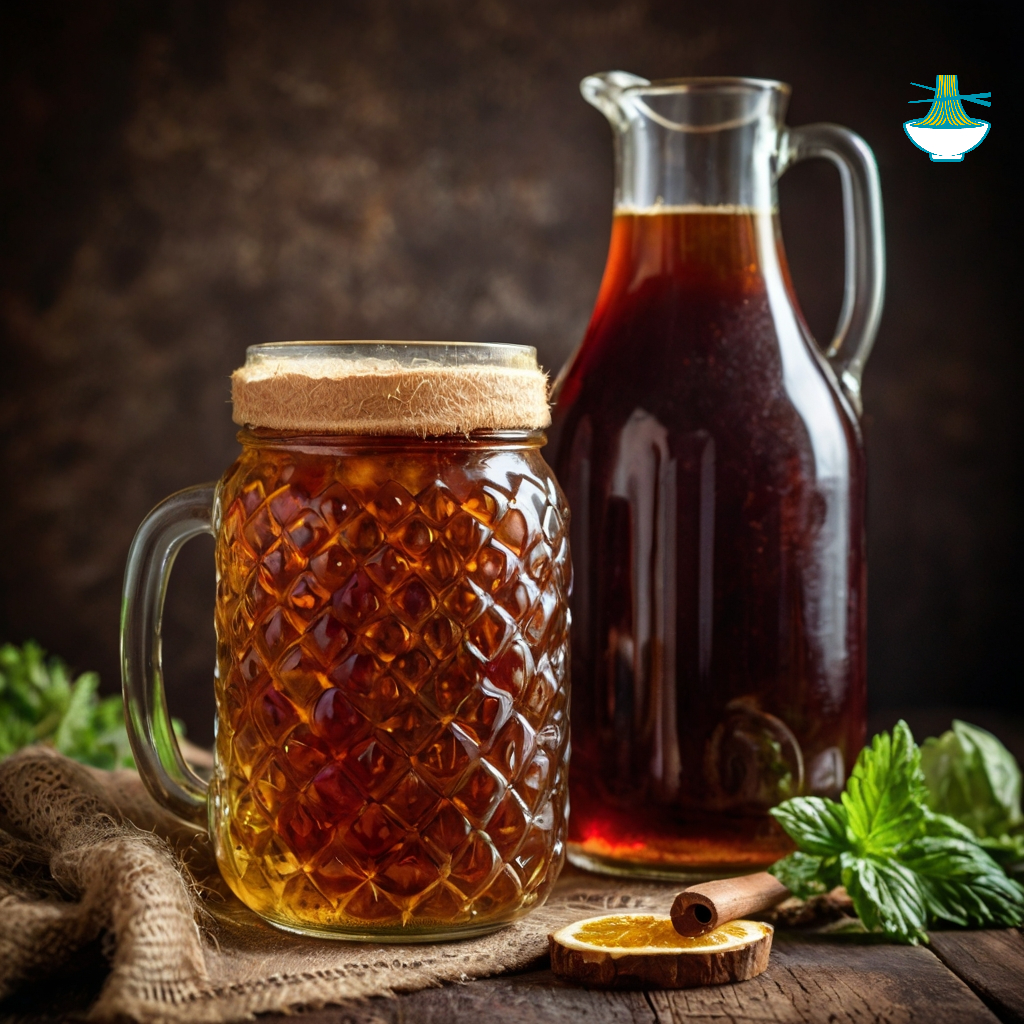Kvass, a traditional Slavic beverage, is made by fermenting rye bread with water, often flavored with fruits or herbs. Its history traces back centuries, originating as a way to utilize stale bread. Over time, it evolved into a beloved drink enjoyed for its tangy flavor and probiotic qualities.
Ingredients:
- 4 slices of rye bread (stale is preferable)
- 4 liters of water
- 1 cup of sugar
- ½ cup of raisins
- 1 tablespoon of active dry yeast
Method:
1. Cut the rye bread into cubes and place them in a large pot.
2. Boil the water and pour it over the bread cubes. Let it cool to room temperature.
3. Add sugar and raisins to the pot, stirring until the sugar dissolves.
4. Sprinkle the yeast over the mixture and stir gently.
5. Cover the pot with a clean cloth and let it sit at room temperature for 2-3 days, stirring occasionally.
6. Once fermented, strain the liquid into bottles, discarding the solids.
7. Refrigerate the bottles for at least 6 hours before serving.
8. Serve chilled and enjoy your homemade kvass!
Nutrition Value:
1. 4 slices of rye bread (stale is preferable):
- Calories: Approximately 320 calories
- Carbohydrates: About 60 grams
- Protein: Around 10 grams
- Fat: Roughly 2 grams
- Sodium: Varies depending on the brand, typically around 400 milligrams
- Cholesterol: 0 milligrams
- Vitamins & Minerals: Contains small amounts of vitamins B1, B2, B3, B6, folate, iron, magnesium, zinc, and phosphorus.
- Nutritional Benefit: Rye bread is a good source of complex carbohydrates, providing sustained energy. It also contains dietary fiber, which aids in digestion and helps maintain bowel health.
2. 4 liters of water:
- Calories: 0 calories
- Carbohydrates: 0 grams
- Protein: 0 grams
- Fat: 0 grams
- Sodium: 0 milligrams
- Cholesterol: 0 milligrams
- Vitamins & Minerals: None
- Nutritional Benefit: Water is essential for hydration and helps regulate body temperature, aid digestion, and transport nutrients.
3. 1 cup of sugar:
- Calories: Approximately 770 calories
- Carbohydrates: About 200 grams
- Protein: 0 grams
- Fat: 0 grams
- Sodium: 0 milligrams
- Cholesterol: 0 milligrams
- Vitamins & Minerals: None
- Nutritional Benefit: Sugar provides quick energy but lacks essential nutrients. However, in this recipe, it acts as a food source for the yeast during fermentation.
4. ½ cup of raisins:
- Calories: Approximately 220 calories
- Carbohydrates: About 60 grams
- Protein: Around 2 grams
- Fat: Roughly 0 grams
- Sodium: 10 milligrams
- Cholesterol: 0 milligrams
- Vitamins & Minerals: Contains significant amounts of vitamins C and K, as well as potassium and various antioxidants.
- Nutritional Benefit: Raisins are a concentrated source of energy and provide natural sweetness to the kvass. They also offer some vitamins, minerals, and antioxidants, promoting overall health.
5. 1 tablespoon of active dry yeast:
- Calories: Approximately 20 calories
- Carbohydrates: About 3 grams
- Protein: Around 3 grams
- Fat: Roughly 0 grams
- Sodium: 5 milligrams
- Cholesterol: 0 milligrams
- Vitamins & Minerals: Contains small amounts of B vitamins, particularly B1 (thiamine), B2 (riboflavin), B3 (niacin), B6, and folate.
- Nutritional Benefit: Yeast serves as the fermenting agent in the kvass, converting sugars into alcohol and carbon dioxide. It also provides some B vitamins, which are essential for energy metabolism and nerve function.


Comments